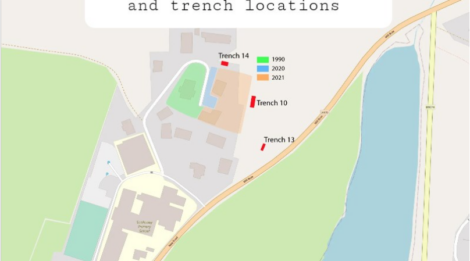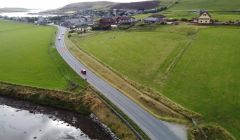Community / Fresh appeal to help rewrite history
A SECOND crowdfunding campaign has been launched to expand archaeological investigations into a site in Scalloway described as being of “huge significance” to Shetland’s history.
In 2020 a total of 26 human remains, some structures thought to be from the Pictish era and various artefacts were discovered in Kristian Leith’s garden at Upper Scalloway after he began groundworks for a bicycle shed.
It followed a previous excavation carried out in the 1990s by Professor Niall Sharples when housing was being built.
The initial crowdfunder for the Skailway project raised nearly £22,000 to finance an excavation that was conducted last summer by Orkney-based archaeologists ORCA.
It has determined that the extent of the settlement is “much larger than first thought”, Leith said this week in a social media post giving a progress update.
That finding tallies with Professor Sharples’ suspicion, but his investigation had been limited to an area of around 1,500 square metres because he did not have access to adjacent privately-owned land.
Leith said further research had established that the settlement extended to the east with a minimum area of around 4,000 square metres and around 18 structures.
“Have we discovered the lost Viking capital for Shetland? Not yet but we are progressing, moving forwards and narrowing the search. Any information that we can collect from this multi period site will increase our understanding of prehistoric Shetland not just the Viking era.”
A new crowdfunder aimed at raising another £20,000 to fund further archaeological investigations into the adjacent field between Mill Brae road and Leith’s home has now been launched.
Leith added that in two years he had gone from digging the foundations for a shed to house his children’s bikes to incorporating a charitable company.
He thanked everyone who has supported the project for their help in rewriting history.
Become a member of Shetland News
“It has been a personal journey of knowledge and historical enlightenment and I would not change it for anything,” he said. “I have thoroughly enjoyed every moment of it and feel very fortunate and privileged to have been able to add something to this historical story.”
In terms of the next steps, Leith said ORCA’s recommendation to conduct “targeted earth resistance” in the field would be followed, using money left over from the existing crowdfunding budget after last year’s investigation was cut short by one week.
A community student excavation is to be organised for this summer and Leith said that, with new housing and other developments planned for the village, time was of the essence to “find out as much as we can, while we can”.
He believes there is a “strong possibility that there could be a shoreside area” that served the settlement “in the Norse medieval period and perhaps even earlier”.
One possible area is the site earmarked for construction of the Co-op’s controversial new supermarket, and Leith said he felt there should “at the very least” be an “archaeological watching brief” during construction.
He added: “Once the mechanical excavators move in and they dig it out, it is gone and lost forever.”
The JustGiving page can be found here.
Become a member of Shetland News
Shetland News is asking its readers to consider paying for membership to get additional perks:
- Removal of third-party ads;
- Bookmark posts to read later;
- Exclusive curated weekly newsletter;
- Hide membership messages;
- Comments open for discussion.
If you appreciate what we do and feel strongly about impartial local journalism, then please become a member of Shetland News by either making a single payment, or setting up a monthly, quarterly or yearly subscription.







































































